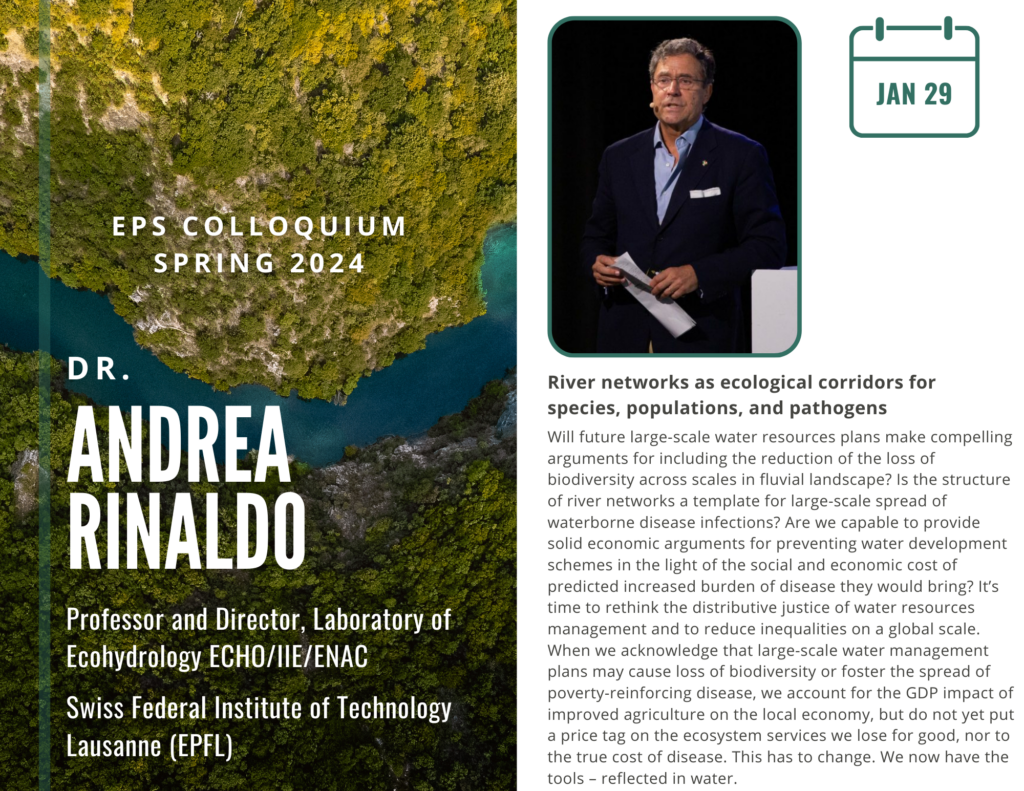EPS Colloquium – Andrea Rinaldo, Swiss Federal Institute of Technology Lausanne (EPFL)
River networks as ecological corridors for species, populations, and pathogens
Will future large-scale water resources plans make compelling arguments for including the reduction of the loss of biodiversity across scales in fluvial landscapea? Is the structure of river networks a template for large-scale spread of waterborne disease infections? Are we capable to provide solid economic arguments for preventing water development schemes in the light of the social and economic cost of predicted increased burden of disease they would bring? Do biological invasions, including historic population migrations that shaped human community compositions as we see them now, depend on physical constraints like the waterscape acting as the substrate for their dispersal? Social discounting applied to public policies concerned with the preservation of the natural capital needs quantitative assessments, and thus environmental science and engineering. Key is our capability to assess and predict the fate of water controls on living communities. My take is: Time is ripe to rethink the distributive justice of water resources management and to reduce inequalities on a global scale. When I travel in the South of the world, I see that access to safe water distribution networks is socially biased, but the ownership of a cell phone is not. When we acknowledge that large-scale water management plans may cause loss of biodiversity or foster the spread of poverty-reinforcing disease, we account easily for the GDP impact of improved agriculture on the local economy, but do not yet put a price tag on the ecosystem services we lose for good, nor to the true cost of disease. This has to change. We now have the tools – reflected in water.
To be added to the EPS colloquium mailing list, please contact Caroline Carr at carolinecarr@fas.harvard.edu.
Recording unavailable

Andrea Rinaldo (born in Venice on September 13, 1954) is a Professor Emeritus, Honorary Professor at the School of of Architecture, Civil and Environmental Engineering (ENAC), EPFL. He is the former Professor of Hydrology and Water Resources and Director of the Laboratory of Ecohydrology. Andrea Rinaldo’s research drew together an integrated ecohydrological framework, which blends laboratory, field, and theoretical evidence focused on hydrologic controls on biota, and has contributed substantially to our understanding of the function of river networks as ecological corridors. This function is relevant to a number of key ecological processes that control the spatial ecology of species and biodiversity in the river basin, the population dynamics and biological invasions along waterways, and the spread of waterborne disease. As examples, one counts metapopulation persistence in fluvial ecosystems, metacommunity predictions of fish diversity patterns in large river basins, geomorphic controls imposed by the fluvial landscape on elevational gradients of species’ richness, zebra mussel invasions of iconic river networks, and the spread of proliferative kidney disease in salmonid fish; or of devastating chronic (schistosomiasis) or epidemic (cholera) infections in human communities. A well-known theoretical contribution by Andrea Rinaldo is that ecological processes in the fluvial landscape are so constrained by hydrology and by the matrix for ecological interactions (the directional dispersal embedded in fluvial and host/pathogen mobility networks), that predictability by spatially-explicit approaches is warranted. Accounting for these drivers required spatial descriptions that have now produced a broad range of results illustrating the predictive power of the methods and the coherent conceptual framework that produced them. Hard-gained experimental and field work supported the theoretical idea. In the process, Andrea Rinaldo was one of the main contributors to establishing Ecohydrology as a mainstream science. The overarching theme of Andrea Rinaldo’s work is the investigation on how the physical structure of the hydrologic environments affects biodiversity, species invasions, and waterborne disease spread by embedding the relevant ecology into the core geoscience of river networks. The relation between the geosciences (the study of the form fluvial ecosystems) is explored from the perspective of ecosystems produced by fluvial processes and forms. In the case of the ecosystem services provided by the river basin, Andrea Rinaldo’s work showed that time is ripe for retooling our decision-making basis. Andrea Rinaldo’s work has changed how we understand the interface between the hydrosphere and the biosphere. Related tools developed in his ECHO Lab also significantly contributed to COVID-19 research (see e.g. publication 8). This happened serendipitously, owing to the expertise developed on spatially-explicit mathematical models of infectious disease spread (in particular epidemic cholera and endemic schistosomiasis, publication 6), acquired in the study of waterborne and water-based disease studies which is central to Ecohydrology.

